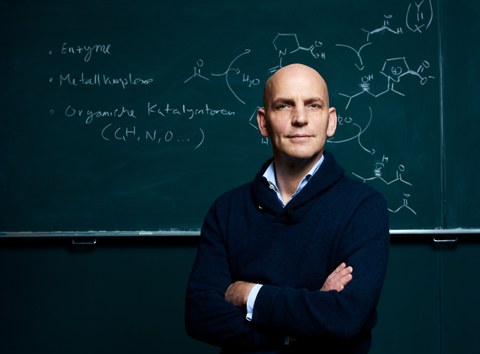Apr 28, 2023
Catalysis for the world: Public lecture by Chemistry Nobel Laureate Benjamin List at TU Dresden
As part of the lecture series "Nobel Laureates at TU Dresden", Prof. Benjamin List, Director of the Max-Planck-Institut für Kohlenforschung in Mühlheim an der Ruhr, will share the magical world of catalysis with the Dresden public. On May 3, 2023 at 7 pm, the 55-year-old Nobel laureate in Chemistry will give a public lecture entitled "Katalyse für die Welt" in the TU Dresden Audimax.
Fascination, beauty and elegance: for Benjamin List, chemistry and especially catalysis is more than just science. For the 55-year-old director of the Max-Planck-Institut für Kohlenforschung, his field of research is more like an almost endless passion from which new dreams arise and which holds the potential to find solutions to the great challenges of our time. Catalysis has already changed the world in the past. There is probably no other technology that can claim to feed, heal, warm and transport people and their goods. Therefore, Benjamin List is convinced that catalysis can also help overcome the current challenges facing humanity, especially global warming and energy conversion.
With his research group, he aims at developing the "perfect chemical reaction": a reaction in which there are no by-products. List has been researching for years how chemical production processes can get more environmentally friendly and sustainable. He is also concerned with the question of how to filter CO2 from the atmosphere. "I think this is a wonderful task for the rest of my career! For me, the idea of doing a kind of artificial photosynthesis, taking CO2 back from the air and doing something different with it, is extremely appealing," List explained in a 2021 interview with Spektrum. "We just take CO2 and use light to turn it into oxygen, which goes back into the atmosphere, and carbon. Now you can think about the form of carbon: It could be coal, of course, [...] But in the past there have always been great discoveries, small chemical revolutions that have changed the world. That would be one of them. The other idea would not be coal, but diamond."
The scientist is not lacking ideas, enthusiasm or motivation. Already at the age of eleven, he wanted to become a chemist, because even then he was looking for answers to the big questions - What is matter made of? What holds the world together at its core? In a way, he probably has the urge to explore in his blood: his great-great-grandfather was Jacob Volhard (1834-1919), a student of the chemistry pioneer Justus von Liebig. His aunt Christiane Nüsslein-Volhard is a developmental biologist who was also honoured with a Nobel Prize in 1995.
Chemistry appeared to Benjamin List as the royal road and he quickly fell for it. He studied chemistry at the Freie Universität Berlin and did his doctorate at the Goethe Universität Frankfurt (1997, Prof. G. Mulzer). At the Scripps Research Institute in La Jolla, California in the United States, he worked as a postdoctoral researcher from 1997 to 1998 and as an assistant professor from 1999 to 2003. In 2003, he moved to the Max-Planck-Institut für Kohlenforschung in Mülheim an der Ruhr as head of a research group and became one of the directors there in 2005. He holds this position until today. He also heads a research group at Hokkaido University in Japan and is an honorary professor at the University of Cologne.
During his time in California, he conducted his first independent experiment. In it, he used the amino acid proline, a naturally occurring organic substance, as an efficient catalyst and thus developed a catalysis process that for the first time did not require any harmful metal compounds. Therefore, he was awarded the Nobel Prize in Chemistry 22 years later. Today, the method of so-called asymmetric organocatalysis, which he founded, is widely used for a variety of reactions, for example in the production of medicines.
The lecture "Katalyse für die Welt" will be held in German on Wednesday, 3 May 2023, at 7 pm in the Audimax of TU Dresden. Admission is free of charge. Registration is requested at: tud.de/mn/nobel
Media inquiries:
Nicole Gierig
Public Relations Officer
TU Dresden
Tel.: 0351 463-39504

